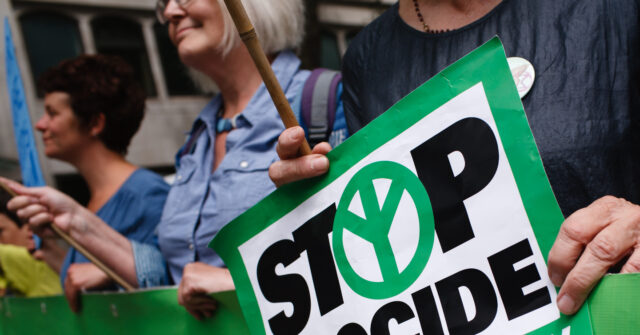

The International Criminal Court should add “ecocide” to its brief alongside genocide, crimes against humanity, and war crimes to criminalise the side effects of farming, fishing and energy production, a green activist argued during the annual World Economic Forum meeting in Davos, Switzerland.
Greta Thunberg ally and CEO of Stop Ecocide International Jojo Mehta demanded during a WEF Davos panel dubbed “Where Nature Meets Conflict” on Tuesday that a new international criminal category of “ecocide” to prevent the “mass damage and destruction of nature”.
Mehta, who co-founded Stop Ecocide in 2017 alongside the late green legal activist Polly Higgins, said at the globalist World Economic Forum meeting: “What our organisation and other collaborators aim to do is to have this recognised legally as a serious crime because one of the issues that pervades this discussion is that we have a culturally engrained habit of not taking damage to nature as seriously as we take damage to people and property.”
While proponents of the legislation have often pointed to disasters such as oil spills and nuclear meltdowns, Mehta suggested that ecocide could be extended to include necessary functions of humanity such as agriculture and energy production.
“If you are campaigning for human rights, at least you know mass murder, torture all of these things are serious crimes, but there is no equivalent in environmental space. Unlike an international crime like genocide that involves a specific intent, with ecocide what we see is what people are trying to do is business, is to farm, is fish, is produce energy, but what is missing is the awareness and the conscience of the side effects, around the collateral damage that happens with that,” the green activist said.
Mehta argued that creating the criminal category of “ecocide” would “steer” individuals, businesses, and governments around the world in a “healthier direction”, presumably out of concern of facing prosecution at the International Criminal Court and potentially lengthy prison sentences.
The green activist has previously explained: “One can envisage, for example, once the law is in place, that a decision that leads to a new coal mine or a decision that leads to the opening of new fossil fuel projects will potentially have to be really seriously rethought.”
Jojo Mehta, founder of Stop Ecocide Now and an ally of Greta Thunberg, tells a WEF panel about her desire to criminalize the side effects of making money from farming, fishing, and creating energy.https://t.co/aJiaQfZlkb pic.twitter.com/4RQqTRUZsN
— Rebel News (@RebelNewsOnline) January 16, 2024
Last year the European Parliament voted in favour of backing draft legislation to recognise “ecocide” as a crime, but it has yet to be voted into EU law.
However, currently 11 nations around the world have codified the concept into their criminal codes including: Vietnam, Russia, Kyrgyzstan, Kazakhstan, Tajikistan, Belarus, Georgia, Ukraine, Moldova, Armenia, and France.
A further 27 countries, including some EU member states, are actively considering following suit, according to Stop Ecocide International.
A landmark case currently being built by Ukraine, which plans to launch legal proceedings against Russia at the International Criminal Court over enviormental damage as a result of Moscow’s invasion of the country. Activists hope that such a case could bolster the legal grounding for ecocide to be recognised as an international crime.
The concept has drawn pushback, however, with legal experts questioning the ability of prosecutors to be able to determine which individuals are actually to blame for man-made disasters, given that they are often the result of numerous people across international borders. Determining blame for disasters supposedly sparked by allegedly man-made climate change would therefore be even more difficult to prosecute.
Mehta’s arguments at the WEF also drew criticism on social media, with Australian Senator Malcolm Roberts saying: “This is what control freaks do: they invent new words, control the language, and stop debate.”
Alarmists Threaten ‘Worldwide Societal Breakdown’ from Climate Crisishttps://t.co/MZbEydMsxQ
— Breitbart London (@BreitbartLondon) October 29, 2023





